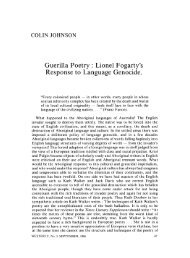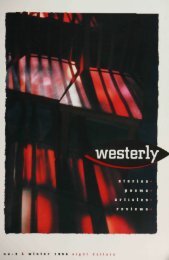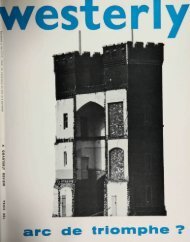society, or, in the terms of the mythology, Marsis the "natural" consort for Venus. Perhaps it issuch violence which a culture, through its ritualsand ceremonies, "naturalises" and makesinvisible. Perhaps poetry in refocussing on theculture's central myths can make the violencevisible and so allow some purchase on it. Evenif poetry may have this power, Porter suggestsat other times, it carries no weight with the hardheadedpragmatic figures who use or live bysocially legitimised violence, Mars and the godsof the social pages, and these rather than thepowerless pay the poet's bills.Mars offers a range of poetic styles,incorporating a diversity of voices and attitudestoward the subject. At times speaking indramatis personae the poems enact aspects ofthe subject rather than delivering authorialpronouncements. These poems, often dramaticmonologues or often drifting into and out of thenovelist's technique of free and indirectdiscourse, enact aspects and attitudes whichmany readers will find unpalatable. Thetechnique of the often unreliable, oftendistasteful, narratorial centre is familiar in theModernist novel, although not so in modernpoetry dominated as it is by the personal lyricand the expectations engendered of confrontingsomehow a companionable guide; it forcesreaders to search for an irony which enables theconstruction of an authorial position where theycan find their values comfortably reflected.There are a number of poems delivered by noset character and while these tempt the readerto reconstruct some core authorial positionPorter subverts such endeavours through thediversity of styles from the bardic swoop of hisvirtuoso parody of Dies [raes and his "minisagas",through Whitmanesque catalogues,prose-poetry, to doggerel like "An average boyof average guilt,/ he often used to wank,/ but nowthe knob his hand is on/is on a Chieftain tank"(p.l04). Continually the poems enact questionsof how and what we might know, and relate theproblem of definition and representation to thetopic of violence and war - do we find orimpose order?Porter's Haephestos the smith declareshimself a type of the poet as "ugliest of gods, . . .the truest maker" (p.20), and considers the "artsof peace and war". Haephestos renders thehuman pride of its resourcefulness and creativeability as he traces the progress of Westerntechnology through a catalogue of inventionswhich invariably begin with military application.The catalogue and the classical frameworkare revealed as entirely appropriate figures forconsidering the arms industry, and thosesocieties which support their economies (and artfunding) with armaments manufacture.In Mars, Porter exploits what is almost hissignature of anachronism to "make strange"images drawn both from contemporary andclassical militarism. Like Auden in "The Shieldof Achilles", Porter offers running parallelsbetween contemporary politics and the Homericlegends of war. Porter~s eye for the tellingcontemporary detail brings the backgroundlegends into sharp clarity.The result is curiously like a television miniseriesView of contemporary power politics, withits focus on the glamourous and sexy, the stars.Here History is the story of lives of the rich andfamous, the elites of the business and militaryinstitutions. Furthermore it is History seenthrough the perspective of a voyeuristic media(or medium) which being neither rich norpowerful likes to believe itself morally detachedand innocent yet is obsessively titillated by whatit reports. (The voyeuristic lingering oversomething which disturbs and arrests is caughtrepeatedly in Boyd's cartoons.)In "Caught in the Net", which revises the netscenefrom the Odyssey (when Vulcan trapsVenus and Mars at their adulterous play andbrings the gods to watch), Porter calls attentionto the voyeurism in a way which deliberatelyimplicates his own reader:A plan is being hatchedat Vulcan Industries. A hired investigatorhelps.Curiously the Chiefs of Staff had blown thewhistle.They could have kept him busy compilingmemoson the Panther Pact, but they wanted to seefor themselveswhat debauchery in the afternoon is reallylike.Picture the scene. His bleeper-watch is by thebed;someone is stationed in the corridor; it ispeach light;what the two are doing feels so good beingdoneyou couldn't name an art which touched itsfringe. (p.35)104WESTERLY, No.2, JUNE, 1989
The "ugliest of gods ... the truest maker" is setup to make the set up. The fiction is notpolitically innocent, it serves the Chiefs for theirown reasons which do not bear much lookinginto.It is typical of Porter to introduce questionsof the power of representation at the point whenhe presses hardest to invoke a physical actualitywhich he despairs lies beyond language and hiscontrol. Those who enjoy the "doing" don'tresort to voyeurism, such unsatisfactoryrepresentations are the desperate measure of theinfirm, the old, the hypocritical -like the Chiefsof Staff, poets and readers. The elision betweenfigures in the story - the old voyeurs, from bothHomer and today - and the implied figure ofthe reader, the elision between historic past andcontinuous present, suggests an assumptionbasic to Porter's use of anachronism: humannature is a matter of universal and unchangingtypes, history is the seasonal reincarnation of anancient drama where character is action.Such a view of psychology and politics hasbecome unfashionable, particularly sinceinvestigation into the cultural specificity andhistorical rootedness of religions and mythology.Porter has recounted Les Murray's warningagainst transposing the Classical gods from theirgeographical and politically specific origins toAustralia (1987, 76). In Mars the gods knowbetter than to chance their arm against Murrayand his native genii; Porter makes minimalreference to the Anzac cult with its centralposition in Australian identity, no doubt anabsence which some readers will regret.Porter's narrative framework describes aclosed and fixed if elusive meaning which to mesits oddly with the overall sceptical, ironictemperament. Change in time becomes theprerogative of external forces represented by thewilful gods and they themselves cannot change.The tale of human oppression and suffering laiddown in the patterns of mythology is a spectacleand diversion for the gods above time. Thejubilantly indifferent divine "he", in "He SaithAmong The Trumpets, Ha Ha", exults:It's human nature anywayto kill and to be slain -of those the battle mangles, somewill have been born again.Let's toast the gods of film and stage,sleek Venus and bold Mars:for once the fault is not in usbut surely in our stars. (p.107)WESTERLY, No.2, JUNE, 1989Whether or not Porter's mythological frameis convincing as historiography it does functionsuccessfully as limited metaphor. And it doesusefully remind us how actions are often closelypatterned on cultural stereotypes, and so revealhow cultural models can interpret humanbehaviour sometimes better than more"scientific" demographic and economic analyses.Certainly examples abound in contemporarypolitics where life imitates soap-art and suggestsuch a motivated attempt to "make" history.Porter's impeached hero, Major Mars,complains in the fashion of a docu-dramatizedOllie North: "God damn it! they'd all seen themovie: they were keen/ to make America fit forHenry Fonda to live in" (p.46).A further question remains: if history is there-enactment of unchanging rituals dramatisedin Classical Mythology can the poet do anythingmore than follow along in the shadow of Homer?When war is represented to be "natural", withus always "like the poor" (p.68), and the problemis the condition itself then satire can be littlemore than an inward turning consolationleading to madness. On the other hand, tocelebrate war and violence, like a Futurist-poetexclaiming over the beauty of the bombingpattern, or like the stern nationalist urging bloodand earth for the nation's "moral fibre", is evenmore absurd and terrifying. The persona of"Mars Bar" speaks with such a tone of buttonedupcraziness:Society is unravellingthrough lack of wars - our worldhas spawned stock like thoseunsavoury Euro-slobswind-surfing beyond the point.Meanwhile poems tangletheir fingers in the windand say much less than they intend to. (p.86)The passage, and the many others like it inMars, send me back to re-read the poem topinpoint the ironic signals, because it must beironic? Uncertainty even in the teeth of suchcertainty is perhaps the point. The poemunsettles and compels re-assessment of attitudesand beliefs. The magisterial disdain and wildgeneralisation recall the rhetoric of newspapereditors and letter writers "concerned" at theirhelplessness in the face of a bewildering worldof change.The ironic register is signalled in the title (aswith many of the poems in Mars), but it is105
- Page 3 and 4:
CONTENTSWESTERLYVOLUME 34, No.2, JU
- Page 5:
WESTERLYa quarterly reviewISSN 0043
- Page 8 and 9:
JAN KEMPTo My Father, M.H.K.My fath
- Page 10 and 11:
JAN KEMPThe GypsySuddenly before yo
- Page 12 and 13:
WONG PHUI NAMA Death in the WardThe
- Page 14 and 15:
WONG PHUI NAMCousinI had to call to
- Page 16 and 17:
WONG PHUI NAMObitIt is as thin smok
- Page 18 and 19:
So thus I lie here fearful of movem
- Page 20 and 21:
VIRGINIA BERNARDA ValedictionWhen N
- Page 22 and 23:
"Yeah, yeah," I call, returning the
- Page 24 and 25:
she flops for a bit, slurps her tea
- Page 26 and 27:
well her students did, she was neve
- Page 28 and 29:
English or Indian, that they had th
- Page 30 and 31:
ANDREW TAYLORSpringSpring is a dive
- Page 32 and 33:
CAROL SElTZERAiming for the MouthTr
- Page 34 and 35:
GRAEME WILSONA Selection of Japanes
- Page 36 and 37:
a highly ambivalent attitude to his
- Page 38 and 39:
Esson attended some rehearsals of T
- Page 40 and 41:
the literary life of Bloomsbury. Lo
- Page 42 and 43:
Without Yeats Esson would quite lik
- Page 44 and 45:
"What theatre do you have in Austra
- Page 46 and 47:
In the back room Esson could feel t
- Page 48 and 49:
"When we started our little theatre
- Page 50 and 51:
a screen against a wall. A theatre
- Page 52 and 53:
VINCENT O'SULLIVANSinging Mastery:
- Page 54 and 55:
flighty relation in most statements
- Page 56 and 57: living and the dead; that places hi
- Page 58 and 59: quite diverse traditions towards th
- Page 60 and 61: WARRICK WYNNEThe Wetlands (for Liam
- Page 62 and 63: JAN OWENSmileOur mother aimed the b
- Page 64 and 65: RICHARD KELLY TIPPINGOlympic Airway
- Page 66 and 67: DAVID REITERBear by the Jasper Road
- Page 68 and 69: (At twenty eight you did not bother
- Page 70 and 71: left, would have risen and walked o
- Page 72 and 73: He had hair like mine used to be, t
- Page 74 and 75: OLIVE PELLThe QuestionTell me how t
- Page 76 and 77: BRIAN MOONANAT 515: MASS LECTURE Th
- Page 78 and 79: PETER KIRKPATRICKTear HereThe bay i
- Page 80 and 81: JOHN WINTERThe Bird ManIn wooded, p
- Page 82 and 83: KNUTE SKINNERAugust 15There's a lig
- Page 84 and 85: M.E. PATTI WALKERThe Hook"Aren't yo
- Page 86 and 87: QMNQMNQMNQMNapartheid man, this is
- Page 88 and 89: QMNQMNQMNeasy because you don't bel
- Page 90 and 91: lands or which have been taken over
- Page 92 and 93: GEOFF GOODFELLOWToo MuchDianne is 1
- Page 94 and 95: SHANE McCAULEYSouth Fremantle, Summ
- Page 96 and 97: JEAN KENTWaiting Out the DroughtWai
- Page 98 and 99: STEPHEN MAGEEJesus Falls, South Aus
- Page 100 and 101: SIMON BROWNBlue Hole, Santothe colo
- Page 102 and 103: CONAL FITZPATRICKA Brown Dog, Off A
- Page 104 and 105: PAUL HETHERINGTONOne RoomIn teeming
- Page 108 and 109: emphasised (I think) in the referen
- Page 110 and 111: Summer Leaves". This continues the
- Page 112 and 113: Deficiency Bill in Western Australi
- Page 114 and 115: invocation of pastoral near the beg
- Page 116 and 117: particularly dreaded). The final re
- Page 118 and 119: VINCENT O'SULLIVAN - is one of New







